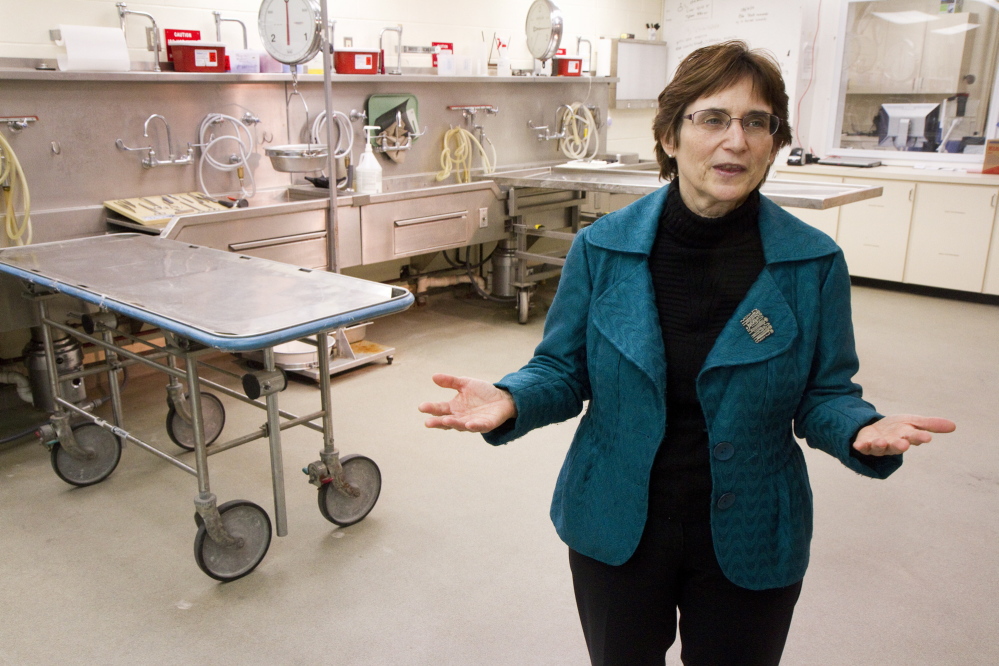The tight-knit community that surrounded Benjamin LaMontagne finally has some answers. The state medical examiner’s office recently released a report stating that the Long Island teenager, who died four days after routine oral surgery in February, was killed by an aggressive bacterial infection.
It took nearly four months after an autopsy was done before the medical examiner’s office reported why the 18-year-old died. The delay is one example of how the office is hampered by a lack of resources, heavy workload and high turnover. And death investigators around the country face similar or worse challenges, delaying prosecutions and adding to the psychic burden of the families of the deceased.
The problems are too big and fundamental for Maine to address on its own. National-level reforms have been proposed, and our state’s congressional delegation should press for their enactment. Without changes in the system that investigates unnatural and unexplained deaths, the greater the burden on the living who await closure and justice.
A VICIOUS CIRCLE
Benjamin LaMontagne died Feb. 22. Though an autopsy was conducted two days later, the cause of his death wasn’t released until June 19. Even worse, the average wait for autopsy results in Maine is six months – twice as long as it should be, according to national standards.
Pressed by Dr. Margaret Greenwald, the now-retired chief medical examiner, legislators in 2013 appropriated funds for new death investigators to reduce the lengthy turnaround time, which has kept Maine from being accredited by the National Association of Medical Examiners. But the office has other issues. A rise in prescription and illicit drug-related deaths – in which autopsies and toxicology tests are mandatory – has added to caseloads and costs. Meanwhile, the office’s $1.3 million annual budget hasn’t varied much over the past five years, barely keeping up with inflation.
All this puts Maine at risk of what Steve Shapiro, chief medical examiner in Vermont, described to the Portland Press Herald/Maine Sunday Telegram as the “medical examiner cycle,” in which medical examiner’s offices operate without sufficient funding and staffing until glaring errors draw media and regulatory attention.
An example close to home is Massachusetts, whose death investigation operation was rocked in 2007 by a series of scandals that included lost corpses and piles of unclaimed bodies. In Oklahoma, the short-staffed medical examiner’s office doesn’t autopsy apparently self-inflicted deaths – allowing savvy criminals who can make a homicide look like a suicide to get away with murder, families have alleged.
These are extreme examples. But things shouldn’t have to deteriorate to that extent to get some attention.
NATIONAL ATTENTION
In the past five years, there have been two major national wake-up calls regarding the quality of state- and local-level forensic practices. A 2009 National Academy of Sciences study found that medical examiners’ offices across the nation are hampered by insufficient resources, poor training and subpar facilities. PBS, National Public Radio and ProPublica followed up two years later with an expose that used a few specific cases to highlight systemic failures among death investigators.
Both reports resulted in a flurry of promises to improve the oversight of forensic operations, but there hasn’t been much meaningful follow-through until this year. Two separate reform proposals have finally started to advance.
The stronger of the two calls for a new national office of forensic sciences and the development of best practices and standards by a committee of scientists. Most significantly, it would greatly increase funding for federal grants to state and local governments to help bolster “the quality and timeliness of forensic science and medical examiner services” – and it ties that funding to the scientific credentialing of all relevant employees, providing an incentive for improvement.
MISPLACED PRIORITIES
Making it a priority to fund medical examiners and coroners is a notable reversal of the usual practice among lawmakers. Politicians usually save government money for people who can vote, not recognizing the significance of a well-performed death investigation.
Autopsies can help bring closure to families, as in the death of Benjamin LaMontagne; provide evidence for a lawsuit or a criminal investigation, and determine whether there’s been an infectious-disease outbreak, a bad batch of illicit drugs or another public health emergency.
The living can learn a lot from the dead, but society won’t benefit from this knowledge unless death investigators get the resources to do their jobs properly. There’s been enough study of the problem – now it’s time for action.
Send questions/comments to the editors.



Success. Please wait for the page to reload. If the page does not reload within 5 seconds, please refresh the page.
Enter your email and password to access comments.
Hi, to comment on stories you must . This profile is in addition to your subscription and website login.
Already have a commenting profile? .
Invalid username/password.
Please check your email to confirm and complete your registration.
Only subscribers are eligible to post comments. Please subscribe or login first for digital access. Here’s why.
Use the form below to reset your password. When you've submitted your account email, we will send an email with a reset code.